Pear variety Limonka
Limonka is an old Ukrainian variety of folk selection (according to VNIISPK - a local Lower Volga variety) with fruits of the summer ripening period. It is included in the state register of plant varieties of Ukraine and approved for cultivation in the Steppe and Forest-steppe of Ukraine. Genetic origin has not been determined.
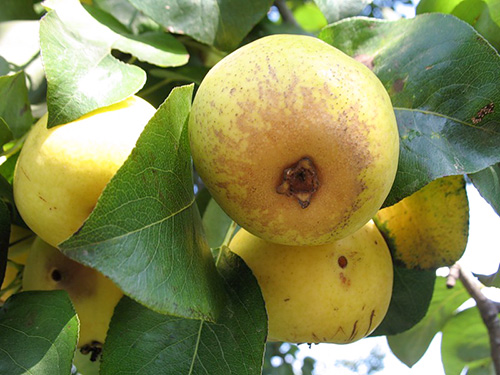
The trees are vigorous (height - up to 6 m, width - up to 5.7 m), durable (reach the age of 60 - 80 years), unpretentious to the soil. The crown is rounded, spreading, of medium density. The branches are straight, with a smooth brown bark, when they leave the trunk, they form sharp corners (30 - 45 degrees). Shoots of medium size, curved, dark brown color. The kidneys are small, narrow, narrow conical in shape. Leaves of medium size, medium thickness, rounded, with wavy, serrated edges. The leaf blade is dark green, leathery, concave in shape, with a smooth glossy surface. The petioles are short, slightly anthocyanin in color, without transition to the central nerve. Stipules are filiform.
The fruits of the Lemonka pear are below average size (weighing about 60 - 80 g, the largest specimens reach 100 g), one-dimensional, even, ovoid. The skin is dry to the touch, the main color is lemon yellow, there is no blush. Subcutaneous points are gray, numerous, located over the entire surface of the fetus. Peduncles are short, woody, light brown in color, curved, set obliquely (obliquely), without overflow.
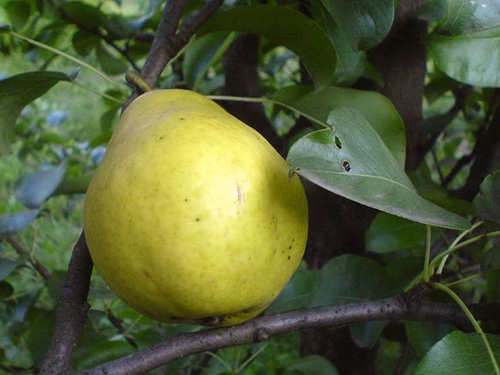
The pulp is yellowish-white in color, with a good dense structure, with large stony cells, with a subtle sourness, slightly aromatic, the taste is mediocre; the lemon flavor is well felt, which is the reason for the name of the variety. However, as practice has shown, the taste of this processed pear is very high - it is great for drying, making jam, jam, compotes and other types of canning. By chemical composition, the fruits contain: dry matter - 19 - 20%, the amount of sugars - 9.9 - 10.1%, titratable acids - 0.17 - 0.2%, ascorbic acid - 3.8 - 5 mg / 100 g, P-active substances - 4 mg / 100 g, the sum of phenolic compounds - 415 mg / 100 g, the sum of pectin substances per wet weight - 0.88%, the ratio of sugar to acid - 62.6 - 74.6. Table variety.
The early maturity of this pear is low: the trees begin to bear fruit only in the 8th - 9th year.
Fruits reach removable maturity at the end of August. The crops are characterized by abundance and regularity. The shelf life of the fruits is very short - a maximum of a week. In some years, there is a strong shedding of unripe fruits.
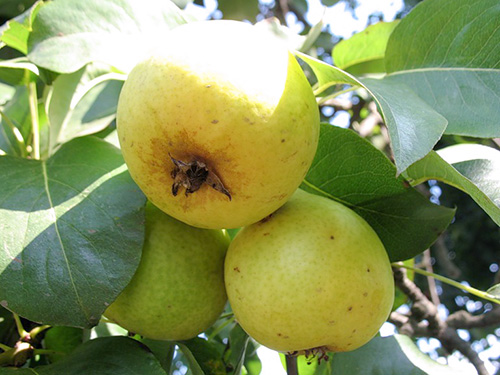
The variety is winter-hardy, resistant to diseases and pests. Occasionally it is affected by scab, septoria and phyllostictosis (brown spot).
The variety is self-fertile. The following varieties are recommended as pollinators: Bessemyanka, Williams, Ilyinka, Forest Beauty, Lyubimitsa Klappa, Tonkovotka.
Among the main advantages of the Limonka pear are: unpretentiousness, abundant regular harvests, good winter hardiness, low susceptibility to diseases and pests.
The disadvantages include: mediocre taste of fruits, vigorous growth of trees, strong crumbling of unripe fruits.
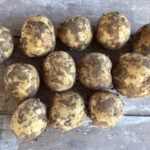
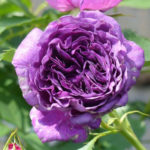
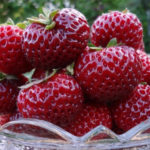

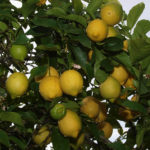
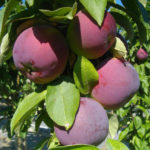



I personally and my family like this variety. The fruits are small and do not have to be divided,i.e. eating a whole pear is quite real. Fruits are yellow, juicy, soft pulp with lemon flavor and sourness. Pears are very easy to remove from the tree, without much effort. A huge plus of Lemonka is that it grows in a garden in a marl-clay soil, where practically nothing takes root at all.
Perhaps, if you try to form a small lemon tree, then the fruits will be larger.And if it grows by itself, like ours, then it is completely covered with trifles. Delicious pear. Sweet, with a thin skin. Its main plus is that it does not have the astringency that is present in other varieties of large pears with thick skin. You can't eat many of them. But Lemon can be eaten like seeds. Little kids and children eat it with pleasure. The fact that it crumbles heavily is even a plus for me. The tree is very tall, and medium-sized fruits, falling into dense grass, are practically not damaged. Of course, fallen fruits are not stored for a long time - this is a significant drawback.
Indeed, it would be very interesting to form a crown at Limonka, and make this tree more stunted. I have never seen this variety cut off somehow.
Many people plant it behind the fence, on the street and in general, they consider it "wild."
But I completely disagree with this, since this tree has very tasty fruits. They are aromatic and sweet, like honey (although it seems to me that a little astringency is still present in them). It is only necessary to "catch" - the required degree of their maturity. The pears should turn bright yellow, but not overripe.
Lemon fruits are probably the smallest of all pear varieties, but because of their taste, as well as early ripening, I really like this variety.
I just cannot agree that Limonka's taste is mediocre - quite original, with sourness, and when fully ripe, sweet, even with a honey tint. In any case, in our area, in the south. If you feed the tree well, shape it correctly, then the shedding is low. Delicious, both fresh and canned. I roll whole fruits into three-liter jars, enjoy ourselves all winter. I also use it for jam, I also make the filling for pies in a special way. The variety does not need special care, it is resistant to diseases. I think that Limonka is one of the most successful varieties, suitable for different latitudes. Here in Dzhankoy he showed himself well, and his mother in the Chernihiv region, and this is much to the north, also bears fruit excellently.
No fetus for about 10 years
Peter, I'm sorry, but I wanted to ask: do you have one tree on your site? The fact is that the description for the variety indicates that a pollinator is needed for this pear. See how your crown is formed. Often, many pears produce so-called "tops" - barren shoots. And very often pears tend to grow like a pyramidal poplar. In this case, the fruit should not be expected.
What should be done? Correctly trim. Pull back the branches using guys and spacers. Plant a pear of a different variety nearby for pollination, but blooming at the same time.
But I really love the Limonka variety. It is very tasty. And in comparison with other summer varieties, it is perfect for preserves and preserves. But we practically do not have them in Kherson. I specifically looked for and with great difficulty found an amateur gardener to take a sprig for grafting. Obviously, our soils and climate are not suitable for this particular variety.